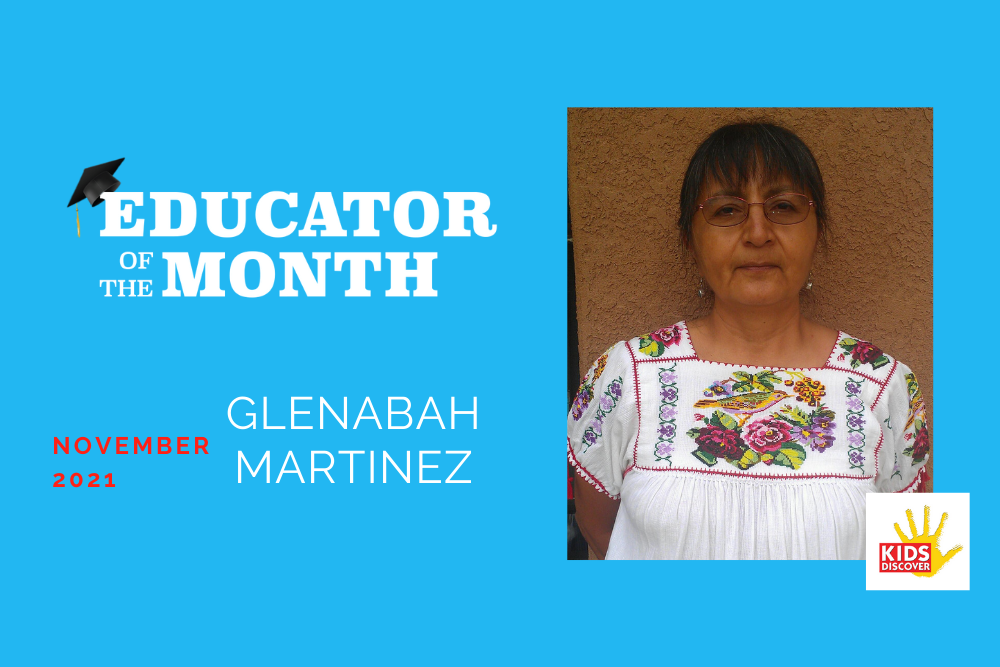Educator of the Month: Glenabah Martinez
- November 9, 2021
- By KIDS DISCOVER
Kids Discover is excited to honor a lifelong educator and professor, Glenabah Martinez as the company’s Educator of the Month for November. Martinez is an associate professor in the Department of Language, Literacy and Sociocultural Studies at the University of New Mexico, Albuquerque. She teaches social studies methods courses, indigenous studies, and, at the high school level, US and New Mexico History. She is an enrolled member of the Pueblo Nation of Taos and affiliated with the Navajo Nation.

What has your teaching career looked like?
I began my teaching career at Polk Middle School in the South Valley of Albuquerque in January 1984 for one semester. In the fall of 1984, I began an eleven year career as a history/social studies educator, primarily at Rio Grande HS in the South Valley. I left New Mexico in 1995 to pursue a Ph.D. at the University of Wisconsin-Madison, where I studied primarily with Professors Michael Apple (chair of my dissertation committee), Gloria Ladson Billings, Stacey Lee, Michael Olneck and Beth Graue. Upon returning to NM to collect data for my dissertation, I was a resource teacher and curriculum writer for the Albuquerque Public Schools Department of Indian Education. In addition, I taught at the University of New Mexico in the Department of Native American Studies and Department of Language, Literacy and Sociocultural Studies. From 2013 to 2017, I was a cultural educator and Native American Studies instructor for Indigenous youth who were incarcerated at the Youth Diagnostic Development Center in Albuquerque.
Where do you teach now and what subject?
As an associate professor, I teach secondary social studies methods, history of U.S. education, sociology of education, educational foundations for preservice educators in elementary, secondary, physical education, early childhood education, and a doctoral seminar in critical educational studies.
What interests you the most about Social Studies Curriculum?
My primary interest since I began my career as a social studies practitioner, curriculum writer, and professor has been on integrating Indigenous histories and perspectives into K-12 curriculum. Curriculum development has been a consistent part of my work not only as a classroom educator but as an Indigenous curriculum writer in New Mexico. I am interested in understanding the history of the curriculum in social studies that goes back to the early twentieth century and the evolution of social studies and history pedagogy since then to now. I am also interested in interrogating official knowledge in social studies and history education and its effects on political socialization and identity development. For example, students should be aware of settler colonialism in empire-building and nation-state formation in the U.S. and across the western hemisphere.
How can teachers best honor and celebrate Native American Heritage with their students?
The best way for educators to do this is by recognizing, acknowledging and implementing Indigenous perspectives into local, state, national, global history classes, and into government, economics, and contemporary world issues courses on a regular basis and not just during the month of November or Indigenous Peoples Day. Students should also be cognizant of the integrity of Indigenous cultures, languages and governance. Equally important, I believe it is important for students to be aware of the sovereign status of Indigenous Peoples in the U.S. and across the globe. And, it is important for teachers to draw critical connections between historical oppression of the past to present-day manifestations of racism and inequality.
Why is it important for teachers to include a multicultural perspective?
Pedagogical approaches that include multicultural education is a good start, but there is more. It is about implementing pedagogy that affirms identities and interrogates the “taken for granted” assumptions about raced, classed, gendered, cultured, and spiritual identities (to name a few). It is about inserting intersectionality into our studies of history and social studies. It is about seeing the link between race and representation as it is played out on sports teams that continue to utilize Indigenous Peoples and cultures as mascots and feature films that continue to stereotype Indigenous Peoples.
What do you love the most about teaching?
I love the energy that I get from the students when we engage in dialogue. I look forward to planning my current class, History of U.S. Education, as I create discussion questions, select primary sources, and identify videos/documentary clips that we can view. I enjoy reading my students’ written work and I absolutely love to see them engage in class activities. I will be teaching about the Mississippi Freedom Schools and the connections between the activism and education in the late 1960s to the 1970s in about one hour and I can’t wait!
What are your hopes for the future of education?
I hope that social studies educators will continue to engage in thoughtful, meaningful pedagogy with their students as a measure toward an informed public. I hope that we will have students who will leave K-12 with a strong historical consciousness and recognize their agency to transform situations and places where inequities and inequality exists. I hope that our students will become adults who can draw connections between contemporary current events/issues/crises to their historical origins. I hope that our students can value life, human dignity, and human rights.